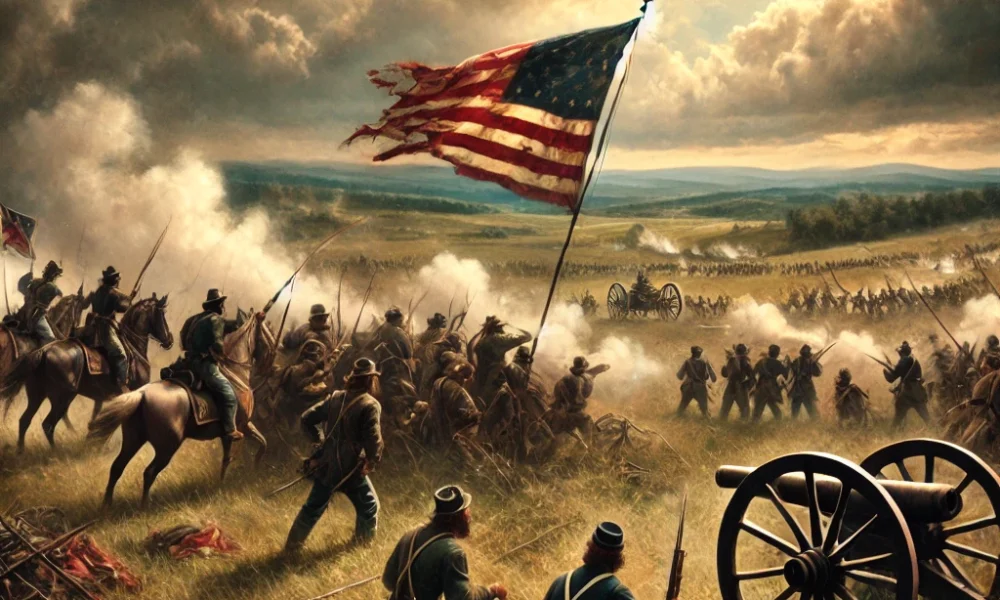The American Civil War, fought between 1861 and 1865, remains one of the most pivotal and transformative events in United States history.
It was a brutal conflict that pitted the Northern states (the Union) against the Southern states (the Confederacy), primarily over issues of slavery, states’ rights, and the future of the nation.
This war not only reshaped the political and social fabric of America but also set the stage for the country’s evolution into a modern, unified nation.
Table of Contents
Causes of the Civil War
The roots of the Civil War can be traced back to the early days of the United States, when tensions between the North and South began to simmer.
The primary cause was the issue of slavery.
The Northern states, which had industrialized and largely abandoned slavery, opposed its expansion into new territories.
In contrast, the Southern economy relied heavily on agriculture, particularly cotton, which depended on enslaved labor.
Other contributing factors included:
- States’ Rights:
Southern states believed in the right to govern themselves and feared federal overreach.
They argued that the federal government had no authority to interfere with their institutions, including slavery.
- Economic Differences:
The North’s industrial economy contrasted sharply with the South’s agrarian system, leading to conflicting interests over tariffs, trade, and infrastructure.
- Political Polarization:
The election of Abraham Lincoln in 1860, who opposed the expansion of slavery, was the final straw for many Southern states.
They viewed his presidency as a threat to their way of life and chose to secede from the Union.
The Confederacy is Formed
In December 1860, South Carolina became the first state to secede from the Union.
By February 1861, six more states—Mississippi, Florida, Alabama, Georgia, Louisiana, and Texas—had joined South Carolina to form the Confederate States of America. Jefferson Davis was elected as the Confederacy’s president.
The Confederacy established its capital in Montgomery, Alabama, and later moved it to Richmond, Virginia.
Circe Madeline Miller: A Journey Through Myth, Magic, and Modern Storytelling
Key Events of the Civil War
The Civil War officially began on April 12, 1861, when Confederate forces attacked Fort Sumter in South Carolina.
Over the next four years, the war would claim the lives of over 600,000 soldiers and countless civilians.
Here are some of the most significant events:
- First Battle of Bull Run (1861):
The first major battle of the war ended in a Confederate victory, shattering the North’s hopes of a quick end to the conflict.
- Emancipation Proclamation (1863):
President Lincoln issued this historic decree, declaring all enslaved people in Confederate-held territory free.
While it didn’t immediately end slavery, it shifted the war’s focus to the abolition of slavery and allowed African Americans to join the Union Army.
- Battle of Gettysburg (1863):
This three-day battle in Pennsylvania was a turning point in the war.
The Union’s victory marked the beginning of the Confederacy’s decline.
- Siege of Vicksburg (1863):
Union forces, led by General Ulysses S. Grant, captured Vicksburg, Mississippi, giving the North control of the Mississippi River and splitting the Confederacy in two.
- Sherman’s March to the Sea (1864):
General William Tecumseh Sherman led a devastating campaign through Georgia, destroying Confederate resources and morale.
- Surrender at Appomattox (1865):
On April 9, 1865, Confederate General Robert E. Lee surrendered to Union General Ulysses S. Grant at Appomattox Court House in Virginia, effectively ending the war.
Aftermath and Legacy
The Civil War concluded with the Union’s victory, preserving the United States as one nation and leading to the abolition of slavery through the 13th Amendment in 1865. However, the war left the country deeply scarred.
The South lay in ruins, with its economy and infrastructure devastated. Reconstruction, the period following the war, aimed to rebuild the nation and integrate formerly enslaved people into society, but it was fraught with challenges, including resistance from Southern states and the rise of segregationist policies.
The war also had profound social and cultural impacts.
It redefined American identity, strengthened the federal government, and set the stage for the civil rights movement a century later.
The sacrifices made during the Civil War continue to be remembered as a testament to the struggle for freedom and equality.
Conclusion
The American Civil War was a defining moment in U.S. history, a conflict born out of deep-seated divisions over slavery, economics, and governance.
While it resolved the issue of secession and abolished slavery, it also left a legacy of pain and unresolved racial tensions.
Understanding the Civil War is essential to comprehending the complexities of American history and the ongoing journey toward a more just and unified society.
As we reflect on this tumultuous period, we are reminded of the resilience of a nation and the enduring pursuit of liberty and justice for all.
FAQ’s On American Civil War Summary
1. When did the US civil war begin and end?
The U.S. Civil War began on April 12, 1861, and ended on April 9, 1865
2. What are the 3 main causes of the Civil War in America?
The three main causes of the American Civil War were:
Slavery – Disputes over its expansion and morality.
States’ Rights – Southern states wanted more autonomy.
Economic Differences – Industrial North vs. agrarian South.
3. Was the Civil War about slavery?
Yes, slavery was the central cause of the Civil War, though issues like states’ rights and economic differences also played significant roles.
4. How many Americans died in the Civil War?
Approximately 620,000 Americans died in the Civil War, making it the deadliest conflict in U.S. history.
This number includes soldiers from both the Union and the Confederacy.
5. Who was the President during the Civil War?
The President of the United States during the Civil War was Abraham Lincoln.
He served from March 1861 until his assassination in April 1865, leading the Union through the conflict and playing a pivotal role in the abolition of slavery.
6. Why did the South lose the Civil War?
The South lost the Civil War due to economic disadvantages, a smaller population, and fewer resources compared to the industrialized North.
The Union’s effective military strategies, like the Anaconda Plan, and key victories at battles such as Gettysburg and Vicksburg further weakened the Confederacy. Additionally, the North’s naval blockade cut off Southern supplies, crippling their economy and war effort.
These factors, along with superior Union leadership, led to the South’s defeat.
7. What was the biggest killer of the Civil War?
The biggest killer of the Civil War was disease, not battlefield injuries.
Poor sanitation, overcrowded camps, and limited medical knowledge led to widespread illnesses like dysentery, typhoid, and pneumonia.


